#political parties ncert
Text
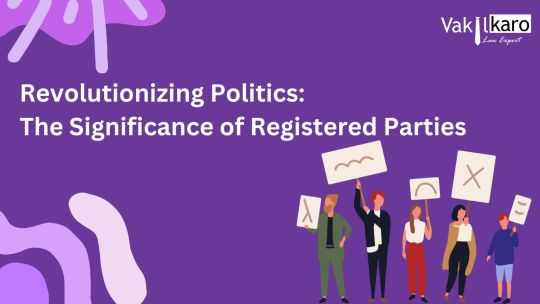
Revolutionizing Politics: The Significance of Registered Parties" explores the transformative role of officially registered political parties in shaping democratic systems. It delves into how these entities drive political engagement and foster representation. In parallel, "Microfinance Company Registration" and "section 8 Microfinance Company Registration" touch on the regulatory processes and legal frameworks governing microfinance institutions. This interplay between political registration and financial regulation highlights the broader impact of formalized structures in both politics and finance, showcasing the vital role of legal recognition in driving positive change in these domains. Read More
#revolutionizing activism#political parties of india#types of political parties in india#political parties ncert#political parties imoprtant questions#indian political parties quiz#political science class 10 political parties#political parties system#indian political parties#political parties indian polity#political parties in india#politics#political parties#poltical parties in india#international association of certified home inspectors#red eagle politics
0 notes
Text
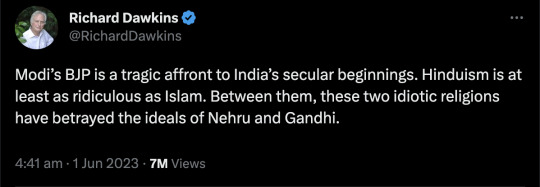
By: Dyani Lewis
Published: May 31, 2023
In India, children under 16 returning to school this month at the start of the school year will no longer be taught about evolution, the periodic table of elements or sources of energy.
The news that evolution would be cut from the curriculum for students aged 15–16 was widely reported last month, when thousands of people signed a petition in protest. But official guidance has revealed that a chapter on the periodic table will be cut, too, along with other foundational topics such as sources of energy and environmental sustainability. Younger learners will no longer be taught certain pollution- and climate-related topics, and there are cuts to biology, chemistry, geography, mathematics and physics subjects for older school students.
Overall, the changes affect some 134 million 11–18-year-olds in India’s schools. The extent of what has changed became clearer last month when the National Council of Educational Research and Training (NCERT) — the public body that develops the Indian school curriculum and textbooks — released textbooks for the new academic year that started in May.
Researchers, including those who study science education, are shocked. “Anybody who’s trying to teach biology without dealing with evolution is not teaching biology as we currently understand it,” says Jonathan Osborne, a science-education researcher at Stanford University in California. “It’s that fundamental to biology.” The periodic table explains how life’s building blocks combine to generate substances with vastly different properties, he adds, and “is one of the great intellectual achievements of chemists”.
Mythili Ramchand, a science-teacher trainer at the Tata Institute of Social Sciences in Mumbai, India, says that “everything related to water, air pollution, resource management has been removed. “I don’t see how conservation of water, and air [pollution], is not relevant for us. It’s all the more so currently,” she adds. A chapter on different sources of energy — from fossil fuels to renewables — has also been removed. “That’s a bit strange, quite honestly, given the relevance in today’s world,” says Osborne.
More than 4,500 scientists, teachers and science communicators have signed an appeal organized by Breakthrough Science Society, a campaign group based in Kolkata, India, to reinstate the axed content on evolution.
NCERT has not responded to the appeal. And although it relied on expert committees to oversee the changes, it has not yet engaged with parents and teachers to explain its rationale for making them. NCERT also did not reply to Nature’s request for comment.
Chapters closed
A chapter on the periodic table of elements has been removed from the syllabus for class-10 students, who are typically 15–16 years old. Whole chapters on sources of energy and the sustainable management of natural resources have also been removed.
A small section on Michael Faraday’s contributions to the understanding of electricity and magnetism in the nineteenth century has also been stripped from the class-10 syllabus. In non-science content, chapters on democracy and diversity; political parties; and challenges to democracy have been scrapped. And a chapter on the industrial revolution has been removed for older students.
In explaining its changes, NCERT states on its website that it considered whether content overlapped with similar content covered elsewhere, the difficulty of the content, and whether the content was irrelevant. It also aims to provide opportunities for experiential learning and creativity.
NCERT announced the cuts last year, saying that they would ease pressures on students studying online during the COVID-19 pandemic. Amitabh Joshi, an evolutionary biologist at Jawaharlal Nehru Centre for Advanced Scientific Research in Bengaluru, India, says that science teachers and researchers expected that the content would be reinstated once students returned to classrooms. Instead, the NCERT shocked everyone by printing textbooks for the new academic year with a statement that the changes will remain for the next two academic years, in line with India’s revised education policy approved by government in July 2020.
“The idea [behind the new policy] is that you make students ask questions,” says Anindita Bhadra, an evolutionary biologist at the Indian Institute of Science Education and Research in Kolkata. But she says that removing fundamental concepts is likely to stifle curiosity, rather than encourage it. “The way this is being done, by saying ‘drop content and teach less’”, she says, “that’s not the way you do it”.
Evolution axed
Science educators are particularly concerned about the removal of evolution. A chapter on diversity in living organisms and one called ‘Why do we fall ill’ has been removed from the syllabus for class-9 students, who are typically 14–15 years old. Darwin’s contributions to evolution, how fossils form and human evolution have all been removed from the chapter on heredity and evolution for class-10 pupils. That chapter is now called just ‘Heredity’. Evolution, says Joshi, is essential to understanding human diversity and “our place in the world”.
In India, class 10 is the last year in which science is taught to every student. Only students who elect to study biology in the final two years of education (before university) will learn about the topic.
Joshi says that the curriculum revision process has lacked transparency. But in the case of evolution, “more religious groups in India are beginning to take anti-evolution stances”, he says. Some members of the public also think that evolution lacks relevance outside academic institutions.
Aditya Mukherjee, a historian at Jawaharlal Nehru University in New Dehli, says that changes to the curriculum are being driven by Rashtriya Swayamsevak Sangh (RSS), a mass-membership volunteer organization that has close ties to India’s governing Bharatiya Janata Party. The RSS feels that Hinduism is under threat from India’s other religions and cultures.
“There is a movement away from rational thinking, against the enlightenment and Western ideas” in India, adds Sucheta Mahajan, a historian at Jawaharlal Nehru University who collaborates with Mukherjee on studies of RSS influence on school texts. Evolution conflicts with creation stories, adds Mukherjee. History is the main target, but “science is one of the victims”, she adds.
==
Well, at least it'll put them on par with the anti-science and biology-denial of US classrooms. China no longer has anything to worry about.
#India#hinduism#islam#science denial#evolution#evolution denial#science#anti science#biology denial#math#mathematics#physics#religion#religion is ignorance#religious stupidity#periodic table#periodic table of elements#religion is a mental illness
114 notes
·
View notes
Text
Study Notes on NCERT Power-Sharing - Class 10 Political Science (Civics)
Introduction:
Power-sharing Class 10 is a vital aspect of democratic governance. It refers to the distribution of power among different organs of government, levels of government, and social groups. This ensures that no single entity can control all aspects of governance, promoting stability and unity in a diverse society.
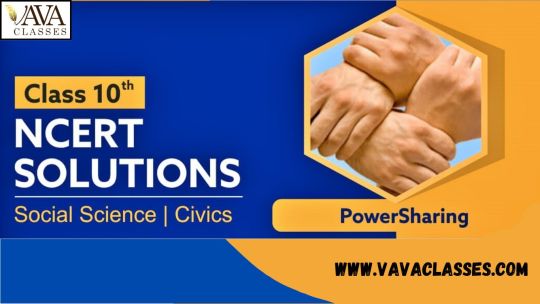
Key Concepts:
1. Forms of Power-Sharing:
Horizontal Power-Sharing: Power is shared among different organs of government such as the legislature, executive, and judiciary. Each organ checks the others, ensuring a balance of power and preventing any one organ from becoming too powerful.
Vertical Power-Sharing: Power is divided among different levels of government. This includes central or national government, state or provincial government, and local government.
Community Government: Power is shared among different social groups, particularly in ethnically diverse societies. This form of power-sharing ensures representation and participation of various communities in decision-making processes.
2. Importance of Power-Sharing:
Promotes Unity: Power-sharing helps in maintaining the unity of a country by giving a voice to diverse groups and ensuring their representation in governance.
Prevents Conflicts: By distributing power among various entities, power-sharing reduces the chances of conflicts and tensions that arise from the dominance of a single group.
Enhances Stability: It promotes political stability by preventing any one group or organ from becoming too powerful, thus encouraging cooperation and compromise.
3. Power-Sharing in Belgium and Sri Lanka:
Belgium:
Belgium has a complex system of power-sharing to accommodate its diverse population, consisting of Dutch-speaking Flemish, French-speaking Walloons, and a small German-speaking community.
The constitution prescribes equal representation of Dutch and French-speaking ministers in the central government. There are separate governments for the three communities, each having powers in cultural, educational, and language-related matters.
Sri Lanka:
Sri Lanka's power-sharing arrangements have been less successful, leading to tensions between the Sinhalese majority and the Tamil minority.
The government adopted majoritarian policies favouring the Sinhalese, leading to demands for autonomy and resulting in a prolonged civil conflict.
4. Ethnic Composition and Accommodation in Belgium:
The Belgian model of power-sharing is based on the principle of accommodation, ensuring that no single community can impose its will on the others.
The constitution requires equal representation from the Flemish and Walloon regions, and the Brussels region has a separate government where both communities have equal representation.
The principle of ‘Community Government’ allows each community to have control over their cultural, educational, and linguistic issues.
5. Majoritarianism in Sri Lanka:
The policy of majoritarianism in Sri Lanka led to the marginalization of the Tamil minority.
The Sinhalese-majority government made Sinhala the official language and provided preferential policies for Sinhalese in education and jobs.
These measures led to widespread disenfranchisement among the Tamils, resulting in demands for an independent Tamil Eelam and a civil war.
6. Types of Power-Sharing:
Power-Sharing Among Different Organs of Government: This involves the distribution of power among the legislature, executive, and judiciary.
Power-Sharing Among Governments at Different Levels: This involves the division of powers between central and state or provincial governments.
Power-Sharing Among Different Social Groups: This includes mechanisms to ensure representation of various social groups, such as religious and linguistic minorities.
Power-Sharing Among Political Parties, Pressure Groups, and Movements: This ensures that various political entities and civil society organizations have a role in governance.
Conclusion:
Power-sharing is a cornerstone of democratic governance, ensuring that power is distributed among various entities to prevent the concentration of power and to promote stability, unity, and accommodation of diverse groups. The experiences of Belgium and Sri Lanka illustrate the importance of adopting inclusive and accommodative approaches to power-sharing in ethnically diverse societies.
Important Terms:
Majoritarianism: A political philosophy that emphasizes the primacy of the majority's will.
Community Government: A form of governance where different communities have the power to manage their own affairs.
Civil War: A war between groups within the same country.
Study Tips:
Understand the key concepts of power-sharing and why they are important for democracy.
Compare and contrast the power-sharing arrangements in Belgium and Sri Lanka to see how different approaches can lead to different outcomes.
Remember the different forms of power-sharing and the examples that illustrate each form.
Reflect on the implications of majoritarian policies and the importance of accommodating minority groups to prevent conflicts.
This summary should help you grasp the essentials of power-sharing as discussed in your Class 10 Political Science (Civics) NCERT textbook.
0 notes
Text
Cracking UPSC Mains GS Paper 2: In-Depth Analysis and Strategies
Introduction
The Union Public Service Commission (UPSC) Civil Services Mains Examination is a crucial step in the journey to becoming a civil servant in India. GS Paper 2, also known as the General Studies Paper II, is an essential component of this examination. In this comprehensive guide, we will provide an in-depth analysis of UPSC Mains GS Paper 2, covering its structure, syllabus, and strategies to excel in this paper.

Understanding UPSC Mains GS Paper 2
GS Paper 2 is a part of the Mains examination and is designed to test a candidate's ability to understand and analyze issues related to governance, polity, social justice, and international relations. It consists of 20 questions divided into two sections: Section-A and Section-B.
Section-A: Governance, Constitution, Polity, Social Justice, and International Relations
This section comprises questions related to:
Indian Constitution: Candidates are expected to have a thorough understanding of the Indian Constitution, its evolution, and its various features.
Governance: Questions may pertain to the functioning of government institutions, policies, and their effectiveness.
Polity: This includes questions on the political system, elections, and political parties in India.
Social Justice: Candidates need to address issues related to social and economic justice, vulnerable sections of society, and social welfare programs.
International Relations: Questions cover India's relations with other countries and international organizations.
Section-B: Social Issues and Social Welfare Legislation
This section focuses on:
Social Issues: Candidates are required to analyze and provide solutions for various social issues such as poverty, unemployment, education, and health.
Social Welfare Legislation: Questions can be related to laws and policies aimed at promoting social welfare and inclusive development.
UPSC Mains GS Paper 2 Analysis
To perform well in GS Paper 2, it's essential to understand the examination's demands and challenges:
Comprehensive Knowledge: A solid grasp of the Indian Constitution, government functioning, and social issues is critical. Regular reading of newspapers and quality reference books is indispensable.
Answer Writing Skills: Candidates must develop the ability to provide clear, concise, and well-structured answers. Use headings, subheadings, and bullet points to enhance readability.
Interlinking Concepts: GS Paper 2 often requires candidates to connect various concepts. For instance, when discussing a social issue, link it to the relevant constitutional provisions or government policies.
Analytical Approach: Focus on analyzing issues from different angles and presenting balanced viewpoints.
Current Affairs Integration: Relate current affairs to topics covered in the syllabus. Keep an eye on relevant national and international developments.
Practice: Solve previous years' question papers and participate in mock tests to develop time management skills and get a feel for the exam's format.
Revision: Regular revision is crucial. Create concise notes for quick revision.
Ethical Perspective: In Section-A, questions on ethics and integrity may be asked. Prepare by studying ethical theories and real-life case studies.
Strategies for Success
Start Early: Begin your preparation well in advance to cover the vast syllabus thoroughly.
Follow a Study Plan: Develop a comprehensive study plan that allocates sufficient time to each topic.
Reading Newspapers: Cultivate the habit of reading newspapers to stay updated with current affairs.
NCERTs: Begin your preparation with NCERT textbooks, which provide a strong foundation for topics covered in GS Paper 2.
Standard Reference Books: Refer to standard books like "Indian Polity" by M. Laxmikanth for in-depth knowledge.
Answer Writing Practice: Regularly practice answer writing, focusing on clarity, conciseness, and relevance.
Mock Tests: Take mock tests under timed conditions to simulate the actual exam environment.
Ethics and Integrity: Understand ethical theories and practice ethical decision-making in your answers.
Conclusion
Cracking UPSC Mains GS Paper 2 requires a combination of comprehensive knowledge, analytical skills, and effective answer writing. Candidates must master the art of connecting constitutional provisions, government policies, and social issues to present holistic answers. With a well-structured study plan, consistent practice, and a strong ethical foundation, success in this paper is within reach. Remember that perseverance and dedication are key to achieving your goal of becoming a civil servant. Good luck with your preparations!
Recommend Readings: UPSC Mains Exam Analysis
0 notes
Text
India has removed the periodic table and evolution from school textbooks
Class 10 students following the Indian government’s syllabus will no longer learn the periodic table of elements. Environmental sustainability has also been removed from the curriculum.
How to get kids to love math, according to Hannah Fry
The National Council of Educational Research and Training (NCERT), which oversees school syllabi for around 134 million students aged 11-18, had earlier even removed evolution from the curriculum, sparking a protest.
“In non-science content, chapters on democracy and diversity; political parties; and challenges to democracy have been scrapped. And a chapter on the industrial revolution has been removed for older students,” Nature has reported.
Shocked experts have critcized the move, saying the removed topics are more than ever relevant today.
“Everything related to water, air pollution, and resource management has been removed...I don’t see how the conservation of water, and air [pollution], is not relevant for us. It’s all the more so currently,” Mythili Ramchand, a science-teacher trainer at the Tata Institute of Social Sciences in Mumbai, told Nature.
NCERT removed the founder of IITs from textbooks
It was reported last month that NCERT had nixed the mention of Maulana Abul Kalam Azad, who fought for India’s independence from Britain and was India’s first education minister, from the class 11 textbook.
In 1951, Azad inaugurated the Indian Institute of Technology (IIT) Kharagpur, in West Bengal, spawning a string of similar elite institutions across the country over the next many decades. Today, having laid the foundation of and propelled India’s technological prowess the world over, the 23 IITs are some of the most sought-after tech schools globally.
The NCERT cited “syllabus rationalization” as the reason for removing Azad’s reference from the textbooks.
It also dropped lessons on the 2002 Gujarat riots (prime minister Narendra Modi was the state’s chief minister then), Mughal courts, the Emergency (1975-77), and the Cold War, among other topics.
0 notes
Text
NCERT removes chapters on 'Mughal Empire' from Class 12 History book
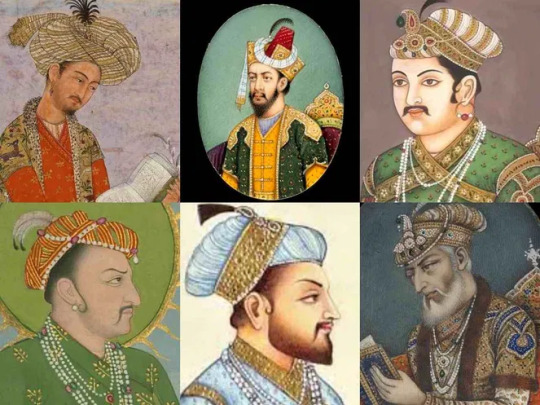
As per NCERT, all the changes made will be implemented from the current academic session, i.e. 2023-2024.
Along with History and Hindi textbooks, 12th class Civics book has also been revised. Two chapters titled, 'American Hegemony in World Politics' and 'The Cold War Era' have been removed from the book.
Continuing with the changes, two chapters namely, 'Rise of Popular Movements' and 'Era of One Party Dominance' from the Class 12th textbook 'Indian Politics after Independence' h ..
0 notes
Text
What impact does politics have on education?

So much that is wrong with public education is due to politics. Education politics on the left is frequently about boosting funds while avoiding accountability for outcomes.
As per research conducted by schools in Pune the right is primarily concerned with the local authority and unrestricted school choice. Equity, quality, and student outcomes are mentioned on both sides, but they are more of an afterthought.
Politics, on the other hand, might promote change in education if people actively voted on the matter. What if education wielded the same political clout as the gun lobby?
Another survey done by schools in Mumbai what if state governors and lawmakers had to pay a political price for insufficient or unequal funding? What if, instead of petty power conflicts, school board elections were based on classroom results?
Even in multimillion-dollar races, often these school board elections now have single-digit turnout rates, making them particularly susceptible to the wrong interests:
Tax eagles opposed to expenditure, unionist parties seeking influence on both ruling sides of the negotiating table, radicals who want to pervert syllabus, racists bent on reinforcing segregation, or overhaul fundamentalists who seek to shake up the status quo irrespective of consequences.
Property owners, whose property prices are closely linked to the quality of the public schooling in their towns, do not appear to be concerned enough to vote. Families whose child's ambitions and goals are related to education do not vote.
School and politics have a long history together, dating back to the birth of democracy. School and politics are inextricably linked in the web of overlapping and interconnecting threads that make up society's structure and cannot be separated.
The Cover Story examines the symbiotic link between education and politics, examining how politics influences various elements of education and vice versa.
On numerous levels, the relationship between education and politics may be shown. Let's take a look at a couple of them in more detail.
Political propaganda via education
Ideology should not be a factor in education. Political parties, on the other hand, consider education as one of the most important tools for spreading and achieving their vision of society.
It is obvious that ruling parties frequently attempt to instil a significant dosage of ideology into the curriculum to strengthen their political hold on young minds.
In India, educational censorship has a long history. Different ruling parties have exploited textbooks and curricula for certain political ends.
This must be considered in light of the current controversy caused by the NCERT board's decision to begin the process of editing textbooks, which opponents have characterised as another ruling extension of the saffron goal of intellectual cleansing.
"The textbooks are created by the National Council of Educational Research and Training (NCERT), which is a government-run organisation.
As a result, a government that is so heavily influenced by politics can have a significant impact on what is taught, when it is taught, and how much it is taught," says Ms Greeshma, Research Scholar, Kerala Forest Research Institute, about the ongoing process of contentious textbook revision.
Madhya Pradesh, Rajasthan, and Chhattisgarh state governments have also been accused of reflecting the political beliefs of the state's ruling party.
Because students come from families and societies, campus politics is a microcosm of the polity outside." Dr Nishad PM, Associate Professor, MACFAST Thiruvalla's Department of Computer Application, explains.
"However, parent groups with vested interests frequently use college politics as a weapon." It breeds unwarranted hostility and violence among pupils," he continues.
When questioned if universities and colleges should be politically neutral institutions, a Calicut University student responded, "Education is vital, let's say main, but politics is also an important component of college life." I'm not suggesting that everyone would get active in politics and despise other political ideas.
However, everybody on campus ought to be aware of what is going on and should resist when our rights have been violated, when you feel abused, or when you are discriminated against."
Parents also go to tremendous measures to ensure that their children attend good schools, paying extravagant prices to reside in affluent districts with good schools or enrolling their children in costly private schools.
Parents in urban areas compete ferociously to enrol their children in talented, magnet, or charter schools, which are typically hundreds of miles distant from their homes. Today, about 2 million children are home-schooled by parents who continue to pay taxes for schools that they do not utilise.
So, while parents claim to cherish accountability and will go to any length to ensure their children have a decent education, they refuse to hold anybody accountable for results by exercising the most effective form of accountability available to them—strategically voting on the matter.
The inability to hold elected officials accountable for school quality has a cascading effect across the system. Politicians are not held accountable by voters, and school systems are not held accountable by politicians. Low performance has little repercussions for schools or instructors.
Education is, without a doubt, the most vital investment that a society can make. It is the most direct route to the dream for people of all races and backgrounds.
Every issue we confront, from unemployment and crime to racism and obesity, can be tackled more effectively via education. Graduates who succeed make a positive contribution to society. Students that do not succeed pay a price.
0 notes
Text
NCERT Book for Class 10 Social Science Political Science in English Chapter 6 Political Parties - Rojgar Samachar
NCERT Book for Class 10 Social Science Political Science in English Chapter 6 Political Parties – Rojgar Samachar
कक्षा 10 सामाजिक विज्ञान राजनीति विज्ञान (लोकतांत्रिक राजनीति-2) अध्याय 6 राजनीतिक दलों के लिए एनसीईआरटी पुस्तक डाउनलोड या पढ़ने के लिए यहां उपलब्ध है। जो छात्र 10 वीं में हैं या 10 वीं सामाजिक विज्ञान पर आधारित किसी भी परीक्षा की तैयारी कर रहे हैं, छात्र अपनी तैयारी में सुधार के लिए एनसीईआरटी सामाजिक विज्ञान ई-बुक का उल्लेख कर सकते हैं। डिजिटल एनसीईआरटी पुस्तक कक्षा 10 सामाजिक विज्ञान पीडीएफ…
View On WordPress
0 notes
Text
NCERT ebook pdf For Class 10 Social Science - Democratic Politics - Free PDF Download
NCERT ebook pdf For Class 10 Social Science – Democratic Politics – Free PDF Download
NCERT Book for Class 10 Social Science – Democratic Politics in English PDF
Chapter 1: Power Sharing
Chapter 2: Federalism
Chapter 3: Democracy and Diversity
Chapter 4: Gender, Religion and Caste
Chapter 5: Popular Strugles and Movements
Chapter 6: Political Parties
Chapter 7: Outcomes of Democracy
Chapter 8: Challenges to Democracy
View On WordPress
0 notes
Text
NCERT Class 12 Political Science (India) Chapter 6 The Crisis of Democratic Order
NCERT Class 12 Political Science Solutions (India Since Independence)
Chapter 6 The Crisis of Democratic Order
TEXTBOOK QUESTIONS SOLVED :
Q l. State whether the following statements regarding the Emergency are correct or incorrect.
(a) It was declared in 1975 by Indira Gandhi.
(b) It led to the suspension of all fundamental rights.
(c) It was proclaimed due to the deteriorating economic conditions.
(d) Many Opposition leaders were arrested during the emergency.
(e) CPI supported the proclamation of the Emergency.
Answer: (a) Correct, (b) Correct, (c) Wrong,
(d) Correct, (e) Correct.
Q 2. Find the odd one out in the context of proclamation of Emergency.
(a) The call for ‘Total Revolution’.
(b) The Railway Strike of 1974
(c) The Naxalite Movement
(d) The Allahabad High Court verdict
(e) The findings of the Shah Commission Report
Answer: (c) The Naxalite Movement
Q 3. Match the following:
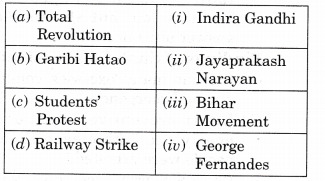
Answer: (a)-(iii), (b)-(i), (c)-(ii), (d)-(iv).
Q 4. What were the reasons which led to the mid-term elections in 1980?
Answer: 1. Janata party lacked direction, leadership and a common programme.
2. Janata party government could not bring a fundamental change in policies pursued by Congress.
3. There was a split in Janata Party and the government led by Morarji Desai which lost its majority in less than 18 months.
4. Charan Singh government was formed due to support of Congress party which later decided to withdraw its support resulting resignation of Charan Singh government within four months.
5. All the above mentioned reasons led midterm elections of 1980, which defeated Janata Party and again Congress led by Indira Gandhi came back to power by winning 353 seats.
Q 5. The Shah Commission was appointed in 1977 by the Janata Party Government. Why was it appointed and what were its findings?
Answer: The Shah commission was appointed in May 1977 by Janata Party government which was headed by J.C. Shah, retired chief justice of Supreme Court of India to look into the matters of:
1. Allegations of abuse of authority, excesses and malpractices as well as actions taken in the name of emergency proclaimed on 25 June 1975.
2. The Commission performed to examine various evidences to give testimonies even including Indira Gandhi to appear before Commission, but she refused to answer any questions.
Findings of Shah Commission:
(a) It found many ‘excesses’ committed during Emergency.
(b) Under preventive detention laws nearly one lakh eleven thousand people were arrested.
(c) Press censorship took place without any proper legal sanctions.
(d) Even general manager of Delhi Power Supply Corporation received verbal orders from the officers of the Lt. Governor of Delhi to cut electricity to all newspapers press at 2 a.m. on 26 June 1975.
Q 6. What reasons did the Government give for declaring a National Emergency in 1975?
Answer: Emergency was proclaimed in response to petition filed by Raj Narain to declare Indira Gandhi’s election invalid.
(i) On June 25, 1975, the government declared the threat of internal disturbances to invoke Article 352 of constitution.
(ii) Article 352 can declare emergency on ground of either internal or external disturbances.
(iii) The government decided a grave crisis to be arisen to proclaim emergency to bring law and order, restore efficiency and implement pro-poor welfare programmes.
(iv) The President Fakhruddin Adi Ahmad proclaimed emergency which became the most controversial episode in Indian Politics.
Q 7. The 1977 elections for the first time saw the Opposition coming into power at the Centre. What would you consider as the reasons for this development?
Answer: The 1977 elections were evolved as a shock to everyone as Congress party was defeated for the very first time and opposition party came into power:
1. The opposition adopted the slogan ‘Save democracy’ against imposition of emergency earlier.
2. The opposition campaigned non- democratic character of rule which provided various excesses.
3. The opposition party highlighted the preventive detention and press censorship to favour public opinion.
4. Janata Party also ensured not to divide non-Congress votes.
5. Middle section of north India was moving away from Congress for whom Janata Party became a platform.
6. Hence, elections of 1977 emerged many other factors instead about emergency only.
Q 8. Discuss the effects of Emergency on the following aspects of our polity.
(a) Effects on civil liberties for citizens.
(b) Impact on relationship between the Executive and Judiciary.
(c) Functioning of Mass Media.
(d) Working of Police and Bureaucracy.
Answer:
(a) Effects on Civil Liberties for Citizens:
1. The government made large scale arrests under preventive detention.
2. Arrested political persons could not challenge arrest even under Habeas Corpus petition.
3. Despite of filing many petitions government claimed it not to be necessary to be informed on grounds to arrested persons.
4. In April 1976, finally it was proved that the government could take away citizen’s right to life and liberty by overruling of high courts under supreme court and accept government’s plea.
(b) Impact on Relationship between the Executive and Judiciary:
1. The Parliament brought in many new changes in Constitution which made an amendment declaring that elections of Prime Minister, President and Vice¬President could not be challenged in the court.
2. The forty-second amendment (42nd) was also passed to bring a series of changes in constitution like duration of legislatures, elections can be postponed by one
year during an emergency.
(c) Functioning of Mass Media:
1. Press censorship took place which banned freedom of press and newspapers w7ere supposed to prior approval before they
publish any material i.e. RSS and Janata Island were banned.
2. Protests, strikes and public agitations were also banned.
3. Various fundamental rights were also suspended including even Right to move to court for restoration of Fundamental Rights.
4. Kannada writer Shivarama Karanth awarded with Padma Bhushan and Hindi writer Fanishwarnath Tlenu with Padmashri returned their awards in protest against suspension of democracy.
5. Newspapers mainly Indian Express, and the statesman protested against censorship by leaving blank spaces where news items were censored.
(d) Working of Police and Bureaucracy:
Refer Part (a) + (b) of the same question.
Q 9. In what way did the imposition of Emergency affect the party system in India? Elaborate your answer with examples.
Answer: 1. Due to absolute majority to party in power, leadership even dared to suspend democratic process.
2. The constitution makers presumed to be abide by laws and democratic orders, hence, wide and open ended powers were given to the government during emergency.
3. A tension and differences arose between institution based democracy and democracy based on spontaneous popular participation.
4. It was attributed to incapability of party system to incorporate aspirations of the people.
5. For the first time, opposition parties came together to form a new party ‘Janata Party’ not to divide the non-Congress votes.
6. 1977 elections brought an end to one party dominance and created coalition government.
Q 10. Read the passage and answer the questions below:
“Indian democracy was never so close to a two-party system as it was during the 1977 elections. However, the next few years saw a complete change. Soon after its defeat, the Indian National
Congress split into two groups
The Janata Party also went
through major convulsions David
Butler, Ashok Lahiri and Prannoy Roy.
—Partha Chatterjee
(a) What made the party system in India look like a two-party system in 1977?
(b) Many more than two parties existed in 1977. Why then are the authors describing this period as close to a two-party system?
(c) What caused splits in Congress and the Janata Party?
Answer: (a) The imposition of emergency in 1977 and political crisis made the party system in India look like a two-party system.
(b) Two parties existed in 1977 were Congress and non-Congress parties to be described as close to two party system because it ended the one party dominance and emerged Janata Party, umbrella of non¬Congress parties.
(c) Split in Congress: Congress splitted on the issues of presidential elections in 1969. Split in Janata Party: On tensions among three leaders Morarji Desai, Charan Singh and Jagjivan Ram for leadership in 1979.
Very Short Answer Type Questions [1 Mark]
Q 1. Mention the main reason for the defeat of Congress party in the elections 1977.
Answer: The opposition party adopted the slogan ‘Save democracy’ against the imposition of emergency.
Q 2. In which year fifth general elections to Lok Sabha held?
Answer: 1971.
Q 3. Name the political party which came to power at centre in 1977.
Answer: Janata Party
Q 4. In January 1974, Students of Gujarat started an agitation against which two major problems?
Answer: 1. Rising prices of food grains, cooking oil and other essential commodities.
2. Corruption in high places.
Q 5. Who was Charu Majumdar?
Answer: Charu Majumdar was a communist revolutionary and the leader of Naxalbari uprising. He founded the Communist Party of India (Marxist Leninist).
Q 6. Name the president who proclaimed emergency in 1975 in India.
Answer. President Fakhruddin Ali Ahmad at midnight on 25 June 1975.
Q 7. Who introduced Twenty Point Programme and Why?
Answer: Congress government led by Indira Gandhi introduced ‘Twenty Point Programme’ to maintain law and order and to restored efficiency including land reforms, eradication of bonded labour, land redistribution, workers participation in management etc.
Q 8. Who became the symbol of restoration of democracy?
Answer: Jayaprakash Narayan, leader of Janata Party.
Q 9. Mention the Historic decision given by the court in famous Kesavananda Bharati Case.
Answer: That there are some basic features of constitution not to be amended by parliament at all. It led to a crisis between the government and judiciary.
Q 10. What was the controversy regarding the appointment of the chief justice A.N. Ray in 1973?
Answer: It became political controversial because in this appointment the government set aside the seniority of three judges who had given ruling against the stand of government.
Q 11. Why did Congress win in Southern states?
Answer: 1. The impact of emergency was not felt equally in all the states.
2. The forced relocation and dis¬placements, the forced sterilisations were mostly concentrated in the northern states.
Q 12. What do you mean by Preventive Detention?
Answer: In Preventive Detention Act, people are arrested and detained on the apprehension to commit any offence in future and government made large scale arrests under this during emergency.
Very Short Answer Type Questions [2 Marks]
Q 1. What factors led to crisis of democratic order in Indian Politics?
Answer: 1. Emergence of Indira Gandhi with a lot of popularity.
2. Party competitions had been created.
3. Relation between the government and judiciary had become tense.
Q 2. Mention the factors which led Naxalite movement in backward states.
Answer: 1. Forced labour
2. Exploitation by moneylenders
3. Exploitation of resources by outsiders.
Q 3. What was Shah Commission of inquiry?
How did government react to it? “
Answer: The Shah commission was appointed in May 1977 by Janata Party government headed by S.C. Shah, retired chief justice of Supreme Court of India to look into the matter of:
1. Allegations of abuse of authority.
2. Excesses and malpractices.
3. Actions taken in the name of emergency proclaimed on 25 June 1975.
The government appeared before commission against various evidences but she refused to answer any question.
Q 4. Describe any two outcomes of Naxalite Movement.
Answer: The ‘Naxalites’ were the Marxist and Leninist Agricultural workers of Andhra Pradesh, West Bengal, Bihar and adjoining areas who organised massive agitations against economic injustice and inequality and demanded redistribution of land to cultivators.
Q 5. Mention circumstances to be characterised for imposition of emergency?
Answer: 1. Emergence of Indira Gandhi.
2. Power Politics became personalised and governmental authority was converted into personalization.
3. Bitter party competition.
4. Tense relations between the government and judiciary.
Q 6. Who organised the first nationwide Satyagraha and Why?
Answer: It was organised by Jayaprakash Narayan for Indira Gandhi’s resignation, he appealed to people not to obey illegal and immoral orders by a massive demonstration on 25 June 1975. All these changed the political mood of the country against Congress.
Short Answer Type Questions [4 Marks]
Q 1. Explain the reasons for students movement of 1974 in Bihar and the role played by Jayaprakash Narayan in this movement.
Answer: Reasons for Student’s Movement of 1974:
Students organised movement against:
1. Rising prices of food grains, cooking oil and other essential commodities.
2. Corruption in high places.
Assess Role played by Jai Prakash Narayan:
Satyagraha was organised by Jayaprakash Narayan for Indira Gandhi’s resignation, he appealed to people not to obey illegal and immoral orders by a massive demonstration on 25 June 1975. All these changed the political mood of the country against Congress.
Q 2. Evaluate the consequences of declaration of emergency in 1975?
Answer: 1. It effected civil liberties of peoples i.e.
in April11976 it was proved that the
government could take away citizens’ right to life and liberty by overruling of high courts under supreme courts and accepted government’s plea.
2. The forth-second Amendment was also passed to bring a series of changes in constitution.
3. It affected the functioning of mass media also as press censorship took place which banned freedom of press and newspapers, which were supposed to prior approval before they publish any material.
4. Despite of filing many petitions government claimed it not to be necessary to be informed the grounds to arrested persons.
Q 3. Explain any two lessons learnt from emergency imposed in 1975.
Answer: The emergency brought out weaknesses and strengths both to India’s democracy:
1. First lesson was felt that it was extremely difficult to do away with democracy in India.
2. Secondly, it amended that internal emergency could be proclaimed only on the grounds of armed rebellion, on the advice to the president to proclaim emergency must be given in writing by council of ministers.
3. Thirdly, emergency made everyone more aware of civil liberties as well as courts also took an active role in protecting civil liberties of individuals.
Q 4. Examine the legacy of emergency of 1975 in India.
Answer: The legacy of emergency was felt in every
sphere of people’s life and politics:
1. Between the elections of 1977 and 1980, Congress identified itself with particular ideology, claiming to be only socialist and pro-poor party.
2. The concept of non-Congression was created among oppositions parties.
3. The issues of welfare of backward classes began to dominate politics i. e. northern states elected non¬Congress leaders of backward class since 1977.
4. This period of emergency saw the period of constitutional crisis to loose its origin in constitutional battle over jurisdiction of parliament and judiciary.
5. This period created political crisis also as the party in power enjoyed absolute majority, still decided to suspend the democratic process.
6. The emergency tensed between institution based democracy and democracy based on spontaneous popular participation for which party system was to be blamed.
Q 5. Why is emergency and period around it known as the period of constitutional crisis? Explain.
Answer: 1. The Parliament brought in many new changes in constitution which made an amendment declaring that elections of Prime Minister, President and Vice President could not be challenged in the court.
2. The forty second amendment was also passed to bring a series of changes in constitution like duration of legislatures, elections can be postponed by one year during emergency.
Q 6. How far do you agree that the government had misused its emergency powers during 1975-77? Explain.
Answer: No, the government hence misused its ‘Emergency Powers’. But it said that it wanted to use the emergency:
1. To bring law and order into society.
2. To restore efficiency into administra¬tion and system.
3. To implement the pro-poor welfare programmes.
Q 7. How did emergency of 1975 benefit the Indian democratic set up?
Answer: 1. Between the elections of 1977 and 1980, Congress identified itself with particulars ideology, claiming to be only socialist and pro-poor party.
2. The concept of non-Congressism was created among opposition parties.
3. The issues of welfare of backward class began to dominate politics
i. e. Northern states elected non-
Congress leaders of backward class since 1977.
4. The emergency tensed between institution based democracy and democracy based on spontaneous popular participation for which party system was to be blamed.
Q 8. Describe any four circumstances for proclamation of emergency in 1975.
Answer:1. Emergence of Indira Gandhi.
2. Power politics became personalised and governmental authority was converted into personalization.
3. Bitter party competition.
4. Tensed relations between the government and judiciary.
Q 9. Discuss the role of Jayaprakash Narayan in Bihar movement and national politics.
Answer: 1. Loknayak Jayaprakash Narayan from Janata Party was a Marxist of youth, who became a Gandhian and involved himself in a Bhoodan movement.
2. He led Bihar movement and opposed the emergency.
3. Bihar students invited him and he accepted on the condition of movement to be non-violent and not to limit only to Bihar territory. Hence, Bihar movement assumed a political character and national appeal.
4. This movement demanded dismissal of Congress government in Bihar and called for total revolution in social, economic and political aspects to establish a total democracy.
5. Bandhs, gheraos, strikes were organised in protest. Even employees of railways organised a strike which threatened to paralyse the country.
6. In 1975, Janata Party led people’s march to parliament to be one of the largest political rallies ever held in capital.
7. Janata was supported by non¬Congress parties like BJS, socialist
parties etc., which projected JP as an alternative to Indira Gandhi.
Q 10. ‘Emergency was a Blackmark in Indian History’. Comment.
Answer: 1. Emergency was declared on the ground of internal disturbances on 25 June 1975 to invoke Article 352 of constitution.
2. Prime Minister Indira Gandhi recommended to impose emergency to president Fakhruddin Ali Ahmad.
3. Emergency was one of the most controversial episode which possessed different virus regarding to impose emergency.
4. Emergency practically suspended the democratic functioning.
5. ‘Shah Commission’ exposed many excesses committed during emergency.
6. Emergency highlighted some hidden matters over constitutional battle between the parliament and judiciary.
7. Tensions or conflicts had been arisen between institution based democracy and popular participation of people.
Passage Based Questions [5 Marks]
1. Read the passage given below carefully and answer the questions:
Once an emergency is proclaimed, the federal distribution of powers remains practically suspended and al 1 t be powc itc
the hands of the union government. Secondly, the government also gets the power to curtail or restrict all or any of the Fundamental Rights during the emergency. From the wording of the provisions of the Constitution, it is clear that an Emergency is seen as an extra-iordinary condition in which normal democratic politics cannot function. Therefore, special powers are granted to the government.
Questions
1. When was emergency imposed?
2. Who recommended emergency to be imposed and to whom?
3. Mention the implications of emergency.
Answer:
1. 25 June 1975.
2. Prime Minister Indira Gandhi recommended to impose emergency to the president Fakhruddin Ali Ahmad.
3. (i) The federal distribution of powers remains practically suspended.
(ii) All the powers are concentrated in the hands of Union government.
(iii) The government also gets power to restrict all or any of Fundamental Rights during emergency.
2. Read the passage given below carefully and answer the questions:
There were many acts of dissent and resistance to the Emergency. Many political workers who were not arrested in the first wave, went ‘underground’ and organised protests against the government. Newspapers like the Indian Express and the Statesman protested against censorship by leaving blank spaces where news items had been censored. Magazines like the Seminar and the Mainstream chose to close down rather than submit to censorship. Many journalists were arrested for writing against the Emergency. Many underground newsletters and leaflets were published to bypass censorship. Kannada writer Shivarama Karanth, awarded with Padma Bhushan, and Hindi writer Fanishwarnath Renu, awarded with Padma Shri, returned their awards in protest against the suspension of democracy. By and large, though, such open acts of defiance and resistance were rare.
Questions
1. Why did people began to protest against government?
2. How did newspapers protest against censorship?
3. How did writers protest against the emergency?
4. Which magazines protested against censorship?
Answer:
1. Against imposition of emergency.
2. Newspaper like Indian Express and the Statesman protested against censorship by leaving blank spaces where news items had been censored.
3. Kannada writer Shivarama Karanth awarded with Padma Bhushan and Hindi writer Fanishwarnath Renu awarded with Padma Shri returned their awards in protest against suspension of democracy.
4. Magazines like ‘Seminar’ and ‘Mainstream’ chose to close down rather than submit to censorship.
Long Answer Type Questions [6 Marks]
Q 1. Analyse any three lessons learnt from the emergency of 1975.
Answer:
(i) The emergency of 1975 at once brought out both the weaknesses’ and the strengths of India’s democracy. Though there are many observers who think that India ceased to be democratic during the emergency, it is noteworthy that normal democratic functioning resumed within a short span of time. Thus, one lesson of Emergency is that it is extremely difficult to do away with democracy in India.
(ii) It brought out some ambiguities regarding the emergency provision in the constitution that have been rectified since. Now ‘internal’ emergency can be proclaimed only on the grounds of ‘armed rebellion’ and it is necessary that the advice to the President to proclaim emergency must be given in writing by the Council of Ministers.
(iii) The Emergency made everyone aware of the value of civil liberties. The courts, too, have taken an active role after the emergency in protecting the civil liberties of the individuals. This is in response to the inability of the judiciary to protect civil liberties effectively during the emergency. Many civil liberties organizations came up after this experience.
Q 2. Examine the three consequences of emergency imposed in 1975.
Answer:
(a) Effects on Civil Liberties of Citizens:
1. The government made large scale arrests under preventive detention.
2. Arrested political persons could not challenge arrest even under Habeas Corpus petition.
3. Despite filing many petitions government claimed it not to be necessary to be informed of grounds to arrested persons.
4. In April 1976, finally it was proved that the government could taken away citizen’s right to life and liberty by over ruling of high courts under supreme court and accepted government’s plea.
(b) Impact on Relationship between Parliament and Judiciary:
1. The parliament brought in many new changes in constitution which made an amendment declaring that election of Prime Minister, President and Vice¬president could not be challenged in the court.
2. The forty-second amendment (42nd) was also passed to bring a series of changes in constitution like duration of legislatures, elections can be postponed by one year during an emergency.
(c) Functioning of Mass Media:
1. Press censorship took place
which banned freedom of press is newspapers were supposed to seek prior approval before they publish any material.
2. Protests, strikes and public agitations were also banned.
3. Various fundamental rights were also suspended including even Right to move to Court for Restoration of Fundamental Rights.
4. Kannada writer Shivarama Karnata awarded with Padma Bhushan and Hindi writer Fanishwarnath Renu with Padmashri returned their awards on protest against suspension of democracy.
5. Newspapers mainly Indian Express, and the Statesman protested against censorship by leaving blank editorial column.
Q 3. Examine any six reasons for the imposition of emergency in India in 1975.
Or
Analyse any three reasons for imposing emergency on 25 June 1975. Did the government misuse its emergency powers? Give any three arguments in support of answers.
Answer: (i) Emergency was proclaimed in response to petition filed by Raj Narayan to declare Indira Gandhi’s election invalid.
(ii) On June 25, 1975, the government declared the threat of internal disturbances to invoke Article 352 of constitution.
(iii) Article 352 can declare emergency on ground of either internal or external disturbances.
(iv) The government decided a grave crisis to be arisen to proclaim emergency to bring law and order, restore efficiency and implement pro-poor Welfare Programmes.
(v) The President FakhruddinAli Ahmad proclaimed emergency which became the most controversial episode in Indian politics.
(vi) Power politics became personalised and governmental authority was converted into personalization
Q 4. Assess any three happenings which were responsible for the downfall of Congress Party in the 1977 elections.
Or
‘The 1977 elections for the first time saw the opposition coming to power at the centre’. Examine any six reasons for this change.
Answer: The 1977 elections were evolved as a shock to everyone as Congress Party was defeated for the very first time and opposition party came into power:
1. The opposition adopted the slogan ‘save democracy’ against imposition of emergency earlier.
2. The opposition campaigned non- democratic character of rule which provided various excesses.
3. The opposition party highlighted the preventive detention and press censorship to favour public opinion.
4. Janata Party also ensured not to divide non-Congress votes.
5. Middle section of North India was moving away from Congress for whom Janata Party became a platform.
6. Hence, elections of 1977 emerged many other factors instead about emergency only.
Q 5. Explain any three outcomes of Lok Sabha elections of 1977.
Answer: 1. In March 1977 elections, for the first time, Congress lost elections with winning 154 seats only.
2. Janata Party and its allies won 330 seats out of 542 seats.
3. Congress lost from the states of Bihar, U.P., Haryana, Delhi and Madhya Pradesh.
4. Janata Party was formed of coalitions under the leadership of Jayaprakash Narayana.
5. Janata Party called this election as a referendum on emergency.
6. Opposition party realised not to divide the votes to enjoy the power under one umbrella.
7. All these indicated a tough time for Congress ahead.
Q 6. What is Naxalite movement? Evaluate its role in Indian politics.
Answer: The Naxalites were the Marxist and Leninist agricultural workers of Andhra Pradesh, West Bengal, Bihar and adjoining areas which organised massive agilations against economic injustice and inequality and demanded redistribution of land to cultivators.
Role in Indian Politics:
1. Naxalite, did not participate in the elections formally but these were actively associated with parties.
2. Naxalites ensured a better representation of demands of deprived social sections in party politics.
3. These movements retained associations or relations alongwith the political parties either as an individual or as an organisations.
Picture/Map Based Questions [5 Marks]
1. Study the picture given below and answer the questions that follow:
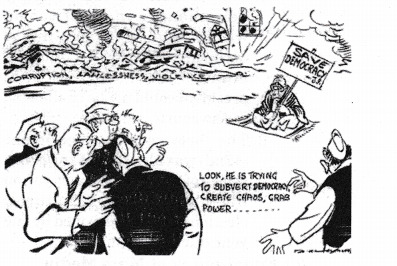
Questions
1. What was the slogan of Janata Party to campaign in elections?
2. Identify the person who is sitting on ground holding the slogan.
3. Against which practices Jayaprakash Narayana agitated?
Answer:
1. Save Democracy.
2. Jayaprakash Narayan.
3. Corruption, lawlessness, violence, and most important against imposition of emergency.
Q 2. Study the picture given below and answer the questions that follow:
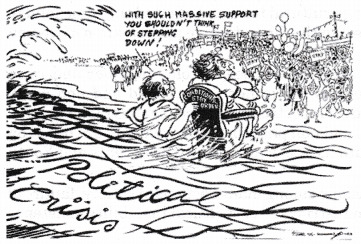
Question.
1. When did cartoon appear in the newspaper and why?
2. Identify the person behind Indira Gandhi.
3. Identify what does the ‘Political Crisis’ stand for. Explain.
Answer:
1. This cartoon appeared few days before the declaration of emergency to capture the sense of impending political crisis.
2. The then Congress president D.K. Barooah.
3. Political crisis in 1977 made the party system in India look like a two party system i.e. Congress and non¬Congress to end one party dominance and emergence of non-Congress party Janata Party as an umbrella for others.
Q 3. Study the picture given below and answer the questions that follow:
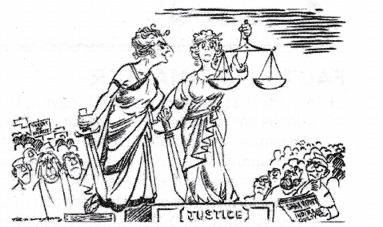
Questions
1. What situation does the picture refer to?
2. Which Commission is represented into the cartoon?
3. Mention some points of this Commission’s report.
Answer:
1. Appearance of Indira Gandhi before Commission but refused to answer any question.
2. Shah Commission’s report about emergency.
3. (i) There were many excesses committed
during emergency.
(ii) Several restrictions were put on the press sometimes without legal sanction.
(iii) Many people were arrested under preventive detention law.
(iv) Even general manager of Delhi Power Supply Corporation received verbal orders from the officers of Lt. Governor of Delhi to cut electricity to all newspaper presses at 2 a.m. on 26 June 1975.
via Blogger https://ift.tt/31OhBB8
0 notes
Text
UPSC CSE: What not to Read
For IAS/IPS/IFS exam preparation.
A good question, sometimes it is indeed important to know what not to do rather what to do. With a zillion different resources in the market, it’s natural if you are confused, so, here’s what you need to avoid:
1- Don’t read politics or crime:

Yes, Newspaper is very important but don’t just read anything and everything. You must be very careful and not waste your time reading the news about party politics or crime.
2- Don’t read all the NCERTs:
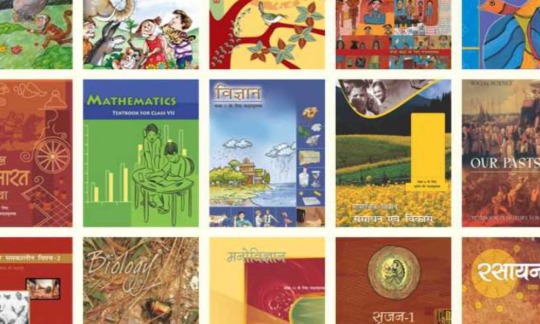
NCERTs are a great source yes, but then, not all of them are important. I personally read only 4–5 of them. Don’t waste your time on reading those which would be covered in other standard books anyways, pick one.
3- Don’t read Current affairs from all the websites available:
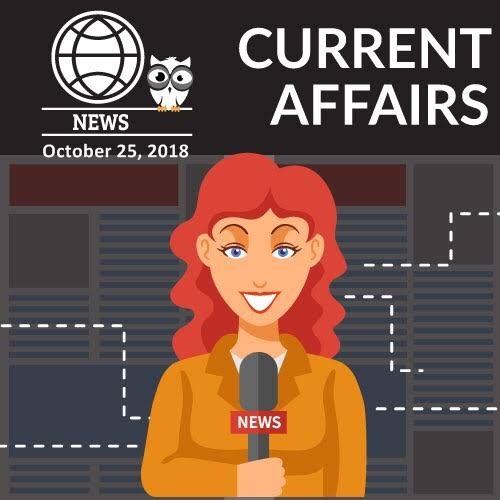
Follow one or at max two of them, that to one of them to be really followed to the fullest and the another one only to be used to fill the gaps.
4- Don’t read magazines like EPW etc:
EPW is a journal, for research purposes, though it is great and sometimes it does carry very useful articles, I read it for my PSIR optional, but anyways, it’s not needed for even that. Similarly, many other magazines like Pratiyogita Darpan, Civil’s Daily, Arihant’s etc are also not at all required, just read the newspaper.
5- Don’t read more than one book for a subject:
Though it’s true that one single book might not cover a 100 percent of the syllabus but then, even 5 books won’t do it. Rather than overburdening yourself and carrying too much information, trust me, it’s more harmful than useful, it’s better you read one book but read it well.
6- Don’t read entire books for small topics:
I see people reading entire books or reports for covering small topics but then, that’s just a waste of time. For example, don’t read ARC’s report in its entirety for GS paper 4, only it’s summary and that to of the relevant chapters. Similarly, don’t read books on Indian society, women empowerment, Science and Technology etc
7- Don’t read too many interviews by the toppers:
Though they are helpful, many candidates end up in the loop of reading one interview and changing their way. It’s just not the right way. You only need to get some overall idea and draw some inspiration if it’s lacking, other than that, strategy has to be your own. Don’t end up being an expert on how to prepare but prepare.
8- Don’t read books like India After Gandhi, Everyone Loves a Good Drought etc:
Though all of them are a great read, they must not be read for the sole purpose of preparation. Actually, it won’t be fair to the books as well, they are works which are needed to be appreciated. They are not meant for CSE preparation and could be read if you can afford that much time, like if you are appearing for 2021 attempt and started preparing now or they can be read once you are in service.
Hope this help, Good Luck!
#writing#spilled ink#indian#inspiration#writers#bibliophile#books#life#writer#quotes#upsc ias#iasacademy#ias#ias preparation#upscaspirants#upscmotivation#upsc#lbsnaa
35 notes
·
View notes
Text
The Politicisation of Education in India
“In a global economy, where the most valuable skill you can sell is your knowledge, a good education is no longer just a pathway to opportunity- it is a prerequisite.” This statement by Barack Obama undeniably strikes true. Education is an essential tool in the arsenal of the empowered that can destroy oppression, elevate economies and change lives. According to a UN Statistic, with each year of schooling, an individual’s income potential increases by 10%. Yet, in India, especially in modern times, the scourge of political powerplay and corruption has plagued the education system.
The interplay of political parties over dominance plays out in the educative sphere of India too as parties try as hard as they can to whitewash them and their allies via education during their tenure. This issue is not modern as Macaulayism, the practice of destroying native heritage and forcibly imposing rigid and alien practices via political policies on education, dates to the 19th century. According to Pr. Kapil Kapoor of JNU the imposition of the English mode of education has destroyed the traditional Indian mode of thought and introspection and created a sense of self-denigration in the minds of Indian populous.
Similar to how Macaulay preached the benevolence of the British instead of the truth, the political right has distorted facts and blended them with myth in an attempt to glorify Hinduism. It is to note that albeit “glorification” of Hinduism may create an apparent sense of “nationalism”, it jades the truth by propagating fabricated falsehoods and leads to disintegration of Indian secularism. The NCERT in recent times has updated various books on the political sciences in an attempt to stir public support for the ruling party from an impressionable age, for example, NCERT’s book on the political sciences for 12th standard experienced changes such as the “Anti-Muslim Riots of Gujarat” in 2002 were simply changed to the “Gujrat Riots” and in an attempt to slander the opposition, the 1984 riots were described to be Anti-Sikh.
Saffronisation, the predilection of Hindu right-wing parties to promote Hindu-centrism in education, has resurfaced in the past years. In a groundbreaking report by the international news organization Aljazeera, children in Gujrat, a right-wing stronghold, are made to believe in pseudo-scientific Hindutva notions for example, that airplanes are an ancient Indian invention from the “Dvapara Yuga”. This creates a covert religious bias and hurts one of India’s defining traits, its vibrant diversity, be it in cultures or religions. Furthermore, Rashtriya Swayamsevak Sangh or the RSS, an alt-right group in India responsible for Mahatma Gandhi’s assassination, has had education boards in its state Uttar Pradesh frequently change textbooks to glorify Hinduism discrediting other religions.
Reservations in educational institutions, a historical policy in India which first came into effect in 1954 guarantee reservations for the SCs, STs, OBCs, Muslims, Sikhs, Buddhists, Jains, and economically weaker sections of the society for opportunities in schools, colleges, teaching posts etc. These came into effect in 1954 however, after 65 years, many in India ask the question – are they relevant in the 21st century? Article 334 which laid the foundation for Indian reservations has been repeatedly amended by political parties to increase its duration of effect every term to influence minority vote-banks. Admittedly, casteism is still prevalent in India in modern times, however, it is mainly concentrated in rural settlements and poverty-stricken ghettos, that issue demands a whole another set of solutions.
Merit based scholarships in India only account for about 0.7% of student aid in India, furthermore, continual politicization of education regarding reservations creates not an atmosphere in which quality education, rather, one in which caste-based divides widen. Labelling someone an SC or ST does in no manner whatsoever invoke egalitarian sentiments rather it divides society on communal lines further.
In addition to hurting the chances of deserving candidates, reservations hurt the public image of SCs and STs too, as many an allegation is launched on an SC/ST candidate after competitive exams, doubting his/her ability and crediting his/her success solely to reservations. The spread of education too gets hindered as the appointment of teachers via reservations does not always ensure the quality of education for the future of the nation, i.e. the students.
There are numerous solutions the government can implement to curb these problems. India is divided into Tier-1 and Tier-2 cities, Tier-3 towns and Tier-4 rural settlements. Reservation can be divided on this basis. The reservations in Tier-1 and Tier-2 cities should be decreased or completely removed on the basis of caste and increased on the basis of financial condition. In Tier-3 towns, caste based reservation should be moderately decreased and reservations for the economicly weaker should be promoted. While in Tier-4 rural settlements, reservations on the basis of caste and for the economic leak should be promoted heavily.
Furthermore to check the clarity of fact and the propagation of truth, an autonomous body should be created that audits educational literature and textbooks to ensure that impartiality and veracity is maintained in order to educate the youth with the plane objective truth and not a mythical blend of fact and fabrication.
This issue is grave and if not solve quickly can effectively hinder the growth of the nation and decrease opportunities for the youth, however, India is a nation which has suffered at the hands of many yet it rose to the occasion and outdid its oppressors. In the words of the former Prime Minister of India, Atal Bihari Vajpayee "सरकारें आएंगी, जाएंगी; पार्टियां बनेंगी, बिखरेंगी, पर यह देश अमर रहना चाहिए|"
3 notes
·
View notes
Text
NCERT Solutions for Class 11 Political Science Chapter 3 Election and Representation
NCERT Solutions for Class 11 Political Science Chapter 3 Election and Representation
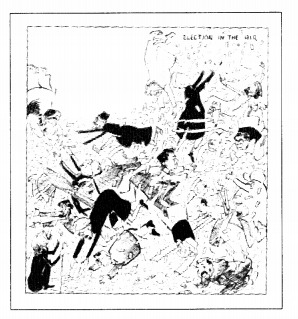
NCERT Solutions for Class 11 Political Science Chapter 3 Election and Representation Class 11 Political Science Chapter 3 NCERT Textbook Questions Solved
Question 1.
Which of the following resembles most a direct democracy?
(a) Discussions in a family meeting.
(b) Election of the class monitor.
(c) Choice of a candidate by a political party.
(d) Decisions taken by the Gram Sabha.
(e) Opinion polls…
View On WordPress
2 notes
·
View notes
Text
Political Parties CBSE Class 10 Democratic policies NCERT Solutions
Political Parties CBSE Class 10 Democratic policies NCERT Solutions
2 notes
·
View notes